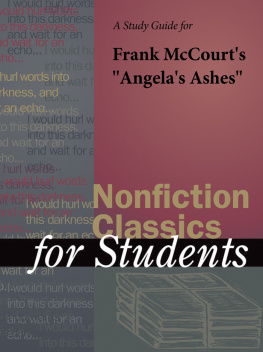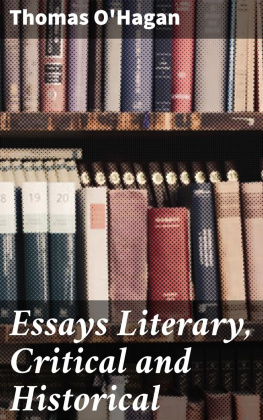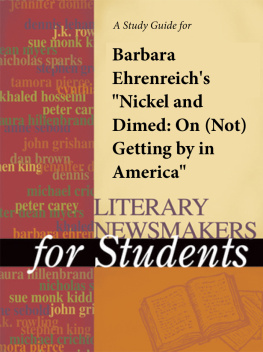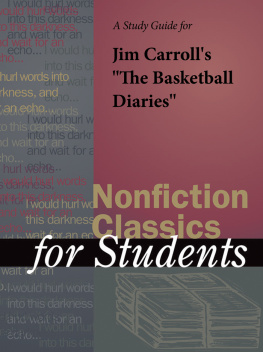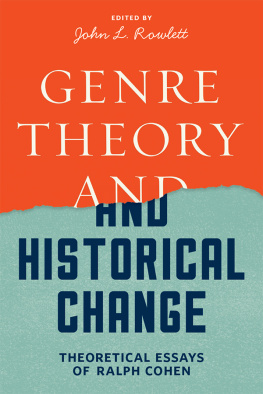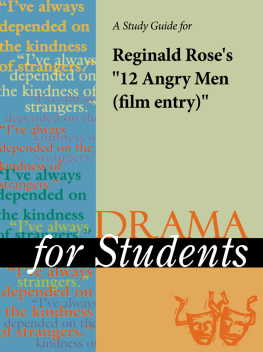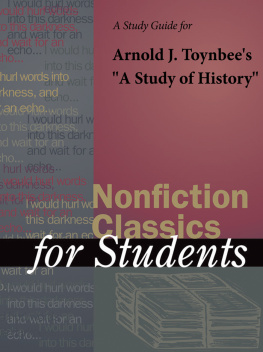TABLE OF CONTENTS
Guide
Nonfiction Classics for Students, Volume 1
Staff
Editor: Elizabeth Thomason.
Contributing Editors: Reginald Carlton, Anne Marie Hacht, Michael L. LaBlanc, Ira Mark Milne, Jennifer Smith.
Managing Editor, Literature Content: Dwayne D. Hayes.
Managing Editor, Literature Product: David Galens.
Publisher, Literature Product: Mark Scott.
Content Capture: Joyce Nakamura, Managing Editor. Sara Constantakis, Editor.
Research: Victoria B. Cariappa, Research Manager. Cheryl Warnock, Research Specialist. Tamara Nott, Tracie A. Richardson, Research Associates. Nicodemus Ford, Sarah Genik, Timothy Lehnerer, Ron Morelli, Research Assistants.
Permissions: Maria Franklin, Permissions Manager. Shalice Shah-Caldwell, Permissions Associate. Jacqueline Jones, Permissions Assistant.
Manufacturing: Mary Beth Trimper, Manager, Composition and Electronic Prepress. Evi Seoud, Assistant Manager, Composition Purchasing and Electronic Prepress. Stacy Melson, Buyer.
Imaging and Multimedia Content Team: Barbara Yarrow, Manager. Randy Bassett, Imaging Supervisor. Robert Duncan, Dan Newell, Imaging Specialists. Pamela A. Reed, Imaging Coordinator. Leitha Etheridge-Sims, Mary Grimes, David G. Oblender, Image Catalogers. Robyn V. Young, Project Manager. Dean Dauphinais, Senior Image Editor. Kelly A. Quin, Image Editor.
Product Design Team: Kenn Zorn, Product Design Manager. Pamela A. E. Galbreath, Senior Art Director. Michael Logusz, Graphic Artist.
Copyright Notice
Since this page cannot legibly accommodate all copyright notices, the acknowledgments constitute an extension of the copyright notice.
While every effort has been made to secure permission to reprint material and to ensure the reliability of the information presented in this publication, Gale neither guarantees the accuracy of the data contained herein nor assumes any responsibility for errors, omissions, or discrepancies. Gale accepts no payment for listing; and inclusion in the publication of any organization, agency, institution, publication, service, or individual does not imply endorsement of the editors or publisher. Errors brought to the attention of the publisher and verified to the satisfaction of the publisher will be corrected in future editions.
This publication is a creative work fully protected by all applicable copyright laws, as well as by misappropriation, trade secret, unfair competition, and other applicable laws. The authors and editors of this work have added value to the underlying factual material herein through one or more of the following: unique and original selection, coordination, expression, arrangement, and classification of the information. All rights to this publication will be vigorously defended.
Copyright 2001
The Gale Group
27500 Drake Road
Farmington Hills, MI 48331-3535
All rights reserved including the right of reproduction in whole or in part in any form.
ISBN 0-7876-5381-0
ISSN 1533-7561
Printed in the United States of America.
10 9 8 7 6 5 4 3 2 1
Angela's Ashes
Frank McCourt
1996
Introduction
In Angela's Ashes, Frank McCourt tells the story of his impoverished childhood and adolescence in Limerick, Ireland, during the 1930s and 1940s. Written from the point of view of the young boy, it is a long catalogue of deprivation and hardship: the alcoholism of his father, the despair of his mother, the deaths of three of his younger siblings, the grinding poverty and unsanitary living conditions they all had to endure. The story takes place in a highly religious society in which the dogmas of Roman Catholicism are accepted without question. In addition to Catholicism, the people of Limerick exhibit a narrow provincialism, in which Protestants and anyone who comes from the north of Ireland are despised, and an Irish nationalism that is fueled by hatred of the English. And yet the effect of the story, although often poignant and sad, is not depressing. The young narrator describes the events without bitterness, anger, or blame. Poverty and hardship are treated simply as if they are a fact of life, like the weather. And in spite of the hard circumstances, many episodes are hilarious.
The combination of childhood innocence, riotous humor, and descriptions of a degree of poverty beyond anything that contemporary readers in the West could imagine made Angela's Ashes a huge commercial success. It is regarded as an outstanding contribution to the growing popularity of the genre of the memoir.
Author Biography
Frank McCourt was born on August 19, 1930, in Brooklyn, New York. He was the first of seven children born to Malachy and Angela McCourt. When he was four, his sister Margaret died. In that same year, the family decided to leave New York and return to their native Ireland. They settled in Limerick in southwest Ireland.
In Limerick during the 1930s, the McCourt family was desperately poor. Malachy McCourt was an alcoholic and was frequently unemployed. McCourt's twin brothers both died of pneumonia, probably due to the unhealthy living conditions. McCourt spent three months in the hospital with typhoid fever when he was ten. In the early 1940s, during World War II, McCourt's father went to England to work in a munitions factory in Coventry, but he never sent any money back to his family. By the age of eleven, McCourt was the family breadwinner. Several years later he quit school and got a job delivering telegrams. He eventually managed to save enough money to leave Ireland for the United States. In 1949, at the age of nineteen, he arrived in New York City and got a job at the Biltmore Hotel. He was eventually fired from the Biltmore and took a series of menial jobs.
McCourt was drafted into the army during the Korean War and served in West Germany. After military service, he attended New York University under the G. I. Bill, where he earned a bachelor's degree in English. He later earned a master's degree in English at Brooklyn College.
For twenty-eight years, beginning in 1959, McCourt taught in schools in New York City. For the last fifteen of those years, he taught English and creative writing at Stuyvesant High School in Manhattan, which was noted for the high quality of its students and where he was known as a popular teacher.
McCourt retired in 1987. In 1994, he began writing a memoir of his life in Ireland, Angela's Ashes, which was published in 1996 by Scribner. The book was a huge success and won many awards, including the Pulitzer Prize.
In 1999, McCourt published 'Tis, a memoir that took up the story of his life where Angela's Ashes left off.
McCourt is married to his third wife, Ellen Frey, a publicist whom he married in 1994. They live in New York City.
Summary
Chapters 1 and 2
Frank McCourt, the narrator of Angela's Ashes, describes his family origins and his early years in Brooklyn. His Irish father fled to America after serving with the Irish Republican Army in their conflict with the British. There he married Angela Sheehan from Limerick. Within a few years, Angela gave birth to five children, one of whom died in infancy. Life is hard in Brooklyn, and relatives arrange for the McCourts to return to Ireland and settle in Limerick. In their one-room dwelling, the entire family sleeps in one flea-infested bed. Frank's father, who is an alcoholic, goes on the dole. Angela accepts charity from the St. Vincent de Paul Society, but her family is miserably poor. Both twins die of pneumonia.

